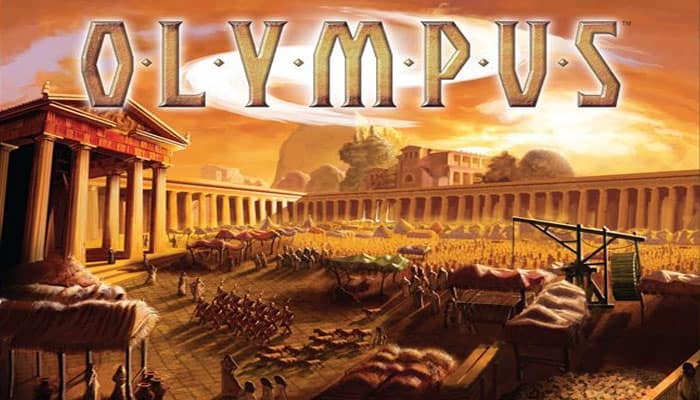
In Olympus, three to five players take on the roles of the leaders of Greek city-states and must guide their city-states to supremacy.
Players use their priests to obtain the favor of the Greek gods on behalf of their city-states. With this favor, players can advance the material and cultural progress of their city-states or bring war and pestilence upon their enemies.
Components

- 1 Game Board
- 5 City-state Sheets
- 165 Common Building Cards
- 12 Unique Building Cards
- 6 Glory Cards
- 25 Wooden Priest Pawns
- 35 Wooden Marker Discs
- 60 Wooden Resource Cubes
- 1 Wooden Starting Player Marker
- Rulebook
Object of the Game
When at least four of the six Glory cards have been claimed, the player with the most victory points wins the game.
Setup
 Setup Diagram (three-player Game) |
Follow the steps below to set up the game:
-
Place Game Board: Place the game board in the central play area, within easy reach of all players.
-
Place Unique Building Cards: Place one Unique Building card in each of the 12 spaces for them on the game board. The order of these cards is irrelevant.
-
Place Resource Cubes: Separate the resource cubes into three pools according to type (grain, meat, and fish) and place them near the game board to create a supply.
-
Place Glory Cards: Place the six Glory cards in a stack near the game board.
-
Take Player Components: Each player chooses a player color and takes:
- 1 City-state Sheet
- 33 Common Building Cards (in his color)
- 5 Priests Pawns (in his color)
- 7 Progress Markers (in his color)
- 3 Resource Cubes (one of each type)
Return any unused city-state sheets, Common Building cards, and wooden pieces not chosen by the players to the game box.
-
Place Priests: Each player places three of his priests in the top three spaces (the light blue squares) of the clergy area on his city-state sheet.
Players leave the bottom two spaces (the green and pink squares) empty for now. Each player places his remaining two priests aside in his own supply. They may become available to the player later in the game.
-

Place Progress Markers: Each player places one of his progress markers on each of the six progress tracks of his city-state sheet. The population progress marker starts on the "2" space, while all other progress markers start on the "1" space.
-
Place Victory Point Marker: Each player places his remaining marker disc on the "0" space of the victory point track on the game board.
-
Place Resources: Each player places his three starting resource cubes in the warehouse area of his city-state sheet.
-
Place Building Deck: Each player places his deck of Common Building cards facedown and conveniently nearby. The player can place them as a single stack, sort them into multiple stacks according to the numbers on the back of the cards, or otherwise organize them as he wishes.
There is no need to shuffle the cards. Players always have access to all of their own common Building cards and can look at them freely. Players must leave an empty area close to their city-state sheet for placing common Building cards they build.
-
Determine Starting Player: Randomly assign the starting player marker to a player, and then begin the game.
Game Play
Olympus is played over a series of rounds, each of which is divided into two phases. The phases of each round are as follows:
Worship Phase: Players use priests to earn the favors of the Olympian deities.
Upkeep Phase: Players resolve certain building effects and prepare for the next round.
All players must complete the Worship phase before the Upkeep phase begins. When all players have completed the Upkeep phase, a new round begins with a new Worship phase.
1. The Worship Phase
During this phase, players send their priests to worship the Olympian deities. As players place priests on the game board, the gods and goddesses grant their favors.
The player with the starting player token is the first active player. He must begin a ceremony to worship one of the deities by placing a priest in that deity's (alpha) space on the game board.
The other players may then opt to join that ceremony by placing a priest in that deity's P (beta) space. When that ceremony is complete, the player to the active player's left becomes the new active player and begins a new ceremony.
All players have an opportunity to participate in every ceremony, as long as they have priests available in the clergy area of their city-state sheet. When all players have used all of their available priests, or when every deity has been worshipped with a ceremony, the Worship phase ends.
Ceremonies
During the Worship phase, the active player must use one of his available priests (those found in his clergy spaces) to begin a worship ceremony. He can only use priests from his city-state sheet (priests already on the game board or in the player's supply cannot be used).
If the active player has no priests available or if all deities already have priests assigned to them, he must pass his turn. If all players pass, the Worship phase ends and the Upkeep phase begins.
To begin a ceremony, the active player takes one of his priests from his city-state sheet and places the priest on the tt space adjacent to the deity of his choice.
Note: Each deity can only be worshipped once each round. If a priest is already in the tt space for a deity (the color of the priest does not matter), no one else can begin a ceremony there. The active player must choose a different deity to begin a ceremony for instead.
After the active player has placed his priest, each of the other players in turn order (starting to the active player's left and proceeding clockwise) may have one of his available priests join the ceremony. To do so, the player places his priest on the P space for that deity.
The active player can never place his priest on the P space. That option is limited to players whose priests are joining a ceremony that has already been started. Each ceremony can have a maximum of one priest of each color in it (i.e., a player may never have more than one of his priests in a particular ceremony).
Note: Each tt space can host only one priest, while each P space can be occupied by any number of priests, but only one priest of each color.
City-state Sheet Anatomy
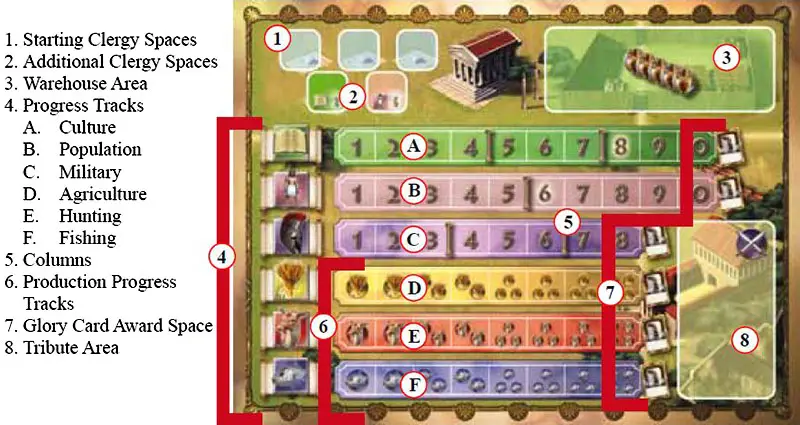
Once all players have chosen whether or not to place a priest at the ceremony, the worshipped deity immediately grants favors to all players who placed priests at that ceremony, in turn, order starting with the active player. The most powerful favor is granted to the priest who began the ceremony and is on the space.
Once all favors have been granted by that deity, the player to the active player's left becomes the new active player and must use one of his available priests to begin a new ceremony (if he does not have any available priests, he must pass his turn).
Players continue starting and joining ceremonies until all players pass on their turn.
Starting and Joining a Ceremony

The yellow player starts a ceremony to Demeter by placing one of his priests in the α space.
The green and blue players join the ceremony by each placing one priest in the β space.
2. The Upkeep Phase
The Upkeep phase is divided into the following steps:
- Apply Warehouse Limit
- Apply Population Limit
- Use Buildings
- Collect Tribute
- Gather Priests
- Check for Game End
All players complete each step before proceeding to the next step. Usually, players can complete each step simultaneously, but if the order is important, the player with the starting player token begins and then play proceeds clockwise to his left.
1. Apply Warehouse Limit
During this step, each player must check to see whether the number of resources stored in his warehouse exceeds his warehouse limit of 5.
If a player has more than five resources in his warehouse, he must immediately discard the excess resources to their correspond- ing supply (he chooses which ones to discard). Note that tributes (all the resources in a tribute area) are not yet in a warehouse, so they do not count towards the warehouse limit.
Example: Jenna has three grain, two meat, and two fish cubes in her warehouse. She must discard two cubes of her choice to the supply so as to not exceed the warehouse limit of 5.
2. Apply Population Limit
In this step, each player must check to see whether any of his progress markers are advanced further on their progress tracks than his population progress marker.
The space his population progress marker occupies determines his current population limit. The player must move his progress markers further advanced than his population limit back on their tracks so that they are even with his population progress marker.
The culture progress marker is an exception to this rule and is unaffected by the population limit. The population limit never causes a player to move his culture progress marker back.
Example: Greg has culture 4, population 3, military 4, agriculture and hunting at 2, and fishing at 4.
His population limit is 3, so he must reduce both military and fishing to 3. He does not move his culture progress marker back, even though it is further advanced than his population progress marker.
3. Use Buildings
In this step, players resolve the effects of any Building cards with the text "In the Upkeep phase". If a player owns more than one such building, he resolves the effects in the order he prefers.
Example: Mandy has built a "Trade Route", so she can exchange one fish cube for a meat cube and a grain cube during the Upkeep phase.
4. Collect Tribute
If there are any resources in the tribute area on a player's city-state sheet (gained from winning a war, see "Ares (God of War)" on page 6), he moves them into his warehouse. They now belong to him and can be used normally.
Example: Carl won a war this turn, so he has two fish cubes in his tribute area. At this point in the Upkeep phase, they are added to his warehouse.
Even though this brings his total to six cubes, he does not have to discard any cubes since players collect tribute after the warehouse limit is applied in Step 1.
5. Gather Priests
Each player returns his priests on the game board to his supply. Then each player takes his priests for the next round from his supply and places them in the clergy area of his city-state sheet. Each player always takes his three starting priests (which are placed on the blue squares of his clergy area).
A player gains an additional priest if his population progress marker is on the "6" space of its track or higher. The player places his priest on the pink square of the clergy area marked with a population icon.
He also gains an additional priest if his culture progress marker is on the "8" space of its track or higher. The player places his priest on the green square of the clergy area marked with a culture icon.
These two conditions are independent, and a player can benefit from both of them. Thus, a player with a 6+ population and a 8+ culture takes five priests during this step and places them in his clergy area.
Example: Mandy's culture progress marker is on the "8" space, and her population progress marker is on the "5" space. She takes four priests to use this round (3 starting + 1 for high culture). If she can increase her population to 6 next round, she will take five priests that round.
Note: Each player determines the number of priests he has available only during this step of the Upkeep phase.
So, if a player fulfills or no longer fulfills the conditions for having additional priests during the Worship phase, he does not immediately update his number of available priests.
Example: When Greg advances his population progress marker to the "6" space, he does not immediately take a new priest.
On the other hand, if it was on the "6" space or higher during the Upkeep phase, but it is moved back to the "5" space or less by a plague (see page 7) or other effects, Greg does not immediately lose a priest.
6. Check for Game End
If the players have claimed a total of at least four Glory cards among them, the game ends.
If the players have not claimed a total of at least four Glory cards, the starting player passes the starting player token to the player to his left, and a new round begins with a new Worship phase.
Divine Favors
The deities dwelling on Mount Olympus offer different favors to the priests who perform ceremonies to worship them. The favors granted are listed according to god in this section. Zeus and Hera are listed last, as their favors are easier to comprehend once the others are fully understood.
Each deity lists the favor for the priest in the α space first, followed by the favor given to each priest in the β space.
Receiving Divine Favors
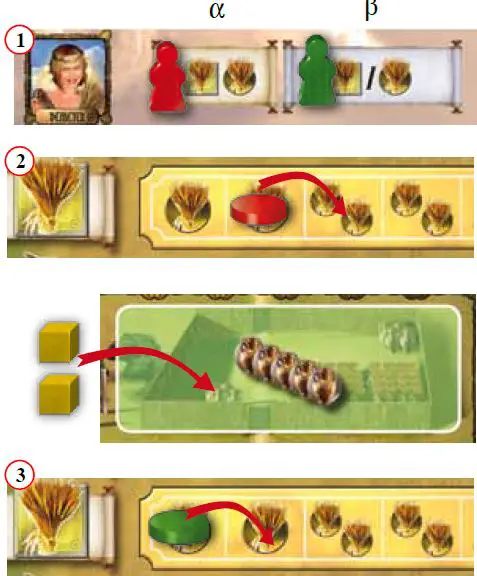
1 The red player occupies Demeter's tt space, and the green player occupies her P space.
2 The red player receives Demeter's tt favor. He advances his agriculture production progress marker one space and then produces grain. He receives two grain cubes.
3 The green player receives Demeter's P favor. He can either advance his agriculture production progress marker one space or produce grain. He chooses to advance his agriculture progress marker one space.
Demeter (Goddess of Agriculture)

α The player advances his agriculture production progress marker one space and then produces grain by taking the amount of grain (yellow cubes) shown on the space currently occupied by his agriculture production progress marker from the supply.
β The player either advances his agriculture production progress marker one space or produces grain by taking the amount of grain (yellow cubes) shown on the space currently occupied by his agriculture production progress marker from the supply.
Artemis (Goddess of the Hunt)

α The player advances his hunting production progress marker one space and then produces meat by taking the amount of meat (red cubes) shown on the space currently occupied by his hunting production progress marker from the supply.
β The player either advances his hunting production progress marker one space or produces meat by taking the amount of meat (red cubes) shown on the space currently occupied by his hunting production progress marker from the supply.
Poseidon (God of the Sea)

α The player advances his fishing production progress marker one space and then produces fish by taking the amount of fish (blue cubes) shown on the space currently occupied by his fishing production progress marker from the supply.
β The player either advances his fishing production progress marker one space or produces fish by taking the amount of fish (blue cubes) shown on the space currently occupied by his fishing production progress marker from the supply.
Athena (Goddess of Wisdom)

α The player advances his culture progress marker two spaces.
β The player advances his culture progress marker one space.
Aphrodite (Goddess of Love)

α The player advances his population progress marker two spaces.
β The player advances his population progress marker one space.
Ares (God of War)

When a player sends a priest to worship Ares, he must decide either to advance his military progress marker or declare war on his opponents:
α The player advances his military progress marker two spaces, or advances his military progress marker one space and declares one war, or does not advance his military progress marker and declares two wars. The player does not declare the targets of the wars at this time, only that the specified number of wars are going- ing to occur.
β The player advances his military progress marker one space, or he does not advance his military progress marker and instead declares one war. The player does not declare the target of the war at this time, only that a war is going to occur.
War
Once all players have had the option to worship Ares, all players who chose to advance their military progress markers do so. Then players resolve all declared wars. Starting with the active player and proceeding clockwise to the left, each player who declared a war announces his target (which must be a single opponent). If the owner of a priest on the tt space declared two wars, he must choose two different targets.
Each player declaring war (the attacker) calculates his military total, which is determined by adding the value of the space his military progress marker occupies to any bonuses from buildings he has built. He then compares his military total to that of his target (the defender).
If the attacker has a higher military total, he takes a number of tributes equal to the difference between the two totals.
Each tribute is a resource owned by the defender and chosen by the attacker that was won in a war. The attacker moves the resource from the defender's warehouse into the attacker's tribute area. If the defender does not have enough resources, the attacker takes all the resources the defender owns.
Note: A player does not own resources in his tribute area, so those resources cannot be taken as tribute if that player is defeated in a war, and they cannot be spent or used in any way (for example, to build a building).
If the attacker has the same military total as the defender, but he is on the tt space, he is considered to be victorious by 1 point and still gains one tribute.
If the attacker has the same military total as the defender and is not on the tt space, or if the attacker has the lower military total, he is repelled. He neither gains nor loses any tribute.
Hephaestus (God of Manufacturing)

α The player builds up to two buildings (see below).
β The player may build one building.
Building
All buildings in the game are represented by cards. Each player has his own deck of 33 Common Building cards with backs corresponding to his player color.
In addition, there are 12 shared Unique Building cards that are available for all players to build. All buildings of both types are built following the same rules; they are simply taken from a different location.
Each player can build each of the Common Building cards from his own Building deck, regardless of what buildings other players have built. However, each of the Unique Building cards can only be built by one player.
Note: The word "building" is used for simplicity, even when the improvement shown on the card is not a building at all (such as a fleet).
Building Card Anatomy
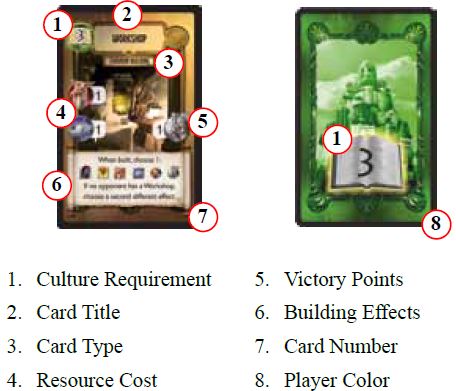
All buildings share the following common characteristics:
Culture Requirement: A player can only build a building if the marker on his culture track is on a space with a number equal to or greater than the number printed here.
Card Type: This text indicates whether a Building card is common or unique.
Card Title: Each building has a name that identifies it.

Resource Cost: In order to build a building, the player must pay the cost in resource cubes shown here. If the symbol is a "wild", the player can spend any resource to pay this cost.
Victory Points: Most buildings immediately award the player one or more victory points when he builds it. He advances his victory point marker the appropriate number of spaces on the victory point track.
Building Effects: Almost all buildings have one or more game effects. Usually, these effects are resolved immediately after the player builds the building. However, some buildings have a long-lasting benefit that the player can use for the rest of the game.
The player chooses which building he wants to build and takes the matching card. He checks that he has the minimum culture required, pays the resources shown (from his warehouse to the supply), and places the card face up next to his city-state sheet.
He immediately scores the victory points indicated on the card (advancing his marker that many spaces on the victory point track). The effects of the building also occur immediately. Most buildings grant a one- time bonus as soon as it is built, but others have a lasting effect.
If a player wants to build one of the unique buildings (assuming he has enough culture and pays the required resources), he takes the card from the game board and places it near his own city-state sheet. Each unique building can be built by only one player during the game (there is only one copy of each Unique Building card).
All players can build each Common Building card once (from their own deck of cards).
Apollo (God of the Sun and Arts, is also a Plague-bringer)

When a player places his priest on Apollo's tt space, he must declare whether he is going to worship Apollo as the God of the Sun or as Apollo the Plague-Bringer.
As the God of the Sun, he grants the following favor:
α The player scores 2 victory points.
β The player scores 1 victory point.
As the Plague-Bringer, he grants the following favor:
α The player initiates and is protected from the upcoming plague and also scores 1 victory point.
β The Player is protected from the upcoming plague.
Plague
Once all players have had the option to worship Apollo, if he has been invoked as the Plague-Bringer, a terrible plague affects all of Greece: each player not protected from the plague loses one third (rounded down) of his population (and immediately moves his population marker backward accordingly).
The protection granted to whoever worships Apollo lasts only for the current round. If the Plague-Bringer is invoked again in a later round, only those who worship him on that occasion are protected.
Zeus (King of the Gods)

α The player chooses any two favors from the list of favors below. They can be the same or different, but are subject to the following restrictions:
- The player cannot advance the same progress marker twice.
- The player cannot produce the same resource twice.
- The player cannot both advance his military marker and declare a war. He can only do one or the other.
β The player chooses any one of the favors from the list of favors below.
When Zeus grants favors, players choose from the following list below:
Advance one of his progress markers one space (population, culture, military, agriculture, hunting, or fishing).
Produce any one resource type (grain, meat, or fish; see Demeter, Artemis, and Poseidon for details on how to resolve production).
Declare one war (see Ares for the rules about wars, but note that if the attacker is tied with the defender he gets nothing, even if his priest on the tt space. Also remember that the target of the war is not declared until the war is resolved; such resolution happens only after all the worshippers of Zeus have received their favors).
Build one building (see Hephaestus for the rules about buildings).
Score 1 victory point.
Hera (Queen of the Gods)

α The player may either advance any two of his agriculture, hunting, or fishing production progress markers one space each or produce any two resource types (grain, meat, or fish; see Demeter, Artemis, and Poseidon for details on how to resolve production).
β ) The player may either advance any one of his agriculture, hunting, or fishing production progress markers one space or produce any one resource type (grain, meat, or fish; see Demeter, Artemis, and Poseidon for details on how to resolve production).
Glory Cards
There are six Glory cards - one for each of the six progress tracks. The first player to reach the last space of each progress track (for example, the "10" space of the culture track) is awarded the matching Glory card.
The player takes the appropriate card from the stack of Glory cards and places it near his city-state sheet. The player immediately scores 2 victory points (as indicated by each card).
Each Glory card is awarded only once and is never lost, even if the progress marker that earned it is moved backward later.
When the fourth total Glory card is awarded among the players, the game ends (at the end of that round).
Glory Card Anatomy
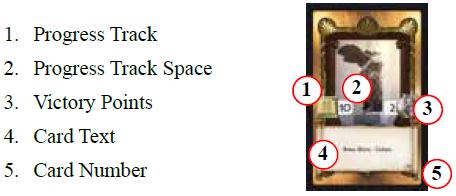
Progress Limits
Columns mark the population, culture, and military progress tracks on the city-state sheets. These columns indicate progress limits. A player cannot advance his progress marker past a column on a progress track unless he owns a building allowing him to do so.
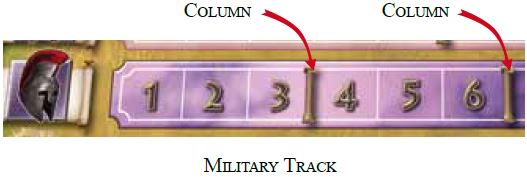
The progress limits and the buildings necessary to surpass them are listed below:
A player's population cannot increase beyond 5 unless he builds an "Agora".
A player's culture cannot increase beyond 4 without a "School", and cannot increase beyond 7 without a "Library".
A player's military cannot increase beyond 3 without the "Barracks", and cannot increase beyond 6 without an "Army".
Whenever the player's progress marker would move past one of these columns, but is not allowed to do so because he hasn't built the required building, the progress marker simply advances as far as the progress limit permits (there is no compensation for advancement that was wasted).
Each progress marker's advancement is also limited by the length of its progress track, and it can never go beyond the last space of the track.
End of the Game
When a player claims the fourth Glory card, the game ends at the end of that round (see "Glory Cards" above).
Players finish playing out that round (including the Upkeep phase), and when the round is complete, the game is over. Each player must then calculate his total victory points.
Each player earns bonus victory points based on how far each of his progress markers advanced on its track: each marker scores victory points equal to half of its current position (rounded down).
Players then add these bonus victory points to their victory points from the victory point track. The player with the highest victory point total wins!
If tied, the tied player who has the most total resources left wins. If still tied, the tied player with the fewest buildings in play wins. If the tie persists, the tied players share the victory.
Example: When the game ends, Jenna has population 4 (worth 2 points), culture 7 (worth 3 points), military 1 (worth 0 points), and each production progress marker at 6 (worth 3 points each).
She receives a total of 14 bonus victory points, which she adds to the victory points she has already accumulated on the victory point track.
Continue Reading
